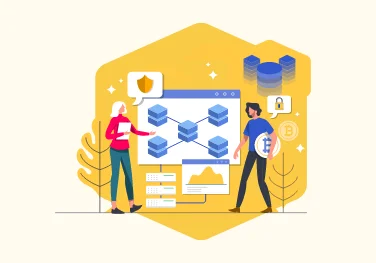WEB3 DEVELOPMENT: A BRIEF GUIDE TO TOOLS AND APIS

Introduction
The Web3 development space offers an array of tools for both new users and seasoned developers to easily create smart contracts and tokens. These tools include APIs and development kits that facilitate learning and creation. Most blockchains use common programming languages or have developed their own, such as Solidity, which is used for Ethereum development.

Despite blockchain technology being in its early stages, the growing number of use cases and increased adoption indicate a forthcoming surge in high-functioning products leveraging Web3 tools. Below are some well-known Web3 development tools that have improved interoperability between blockchains and provided user-friendly tutorials.
INFURA (SDK & API)
Infura is a well-trusted Web3 development toolkit providing APIs and developer products to kick-start anyone's journey in the space. It offers development environments, smart contract templates, and various Ethereum plugins. Notable Web3 products using Infura include Uniswap, MetaMask, Zapper, and Compound Finance. Infura allows you to connect to the Ethereum network without running your own node, making it a convenient option for building decentralized applications. Infura also offers a free plan, ideal for developers starting out.
Many large blockchain projects (wallets, exchanges, and DeFi ecosystems) use Infura, making it one of the most trusted Web3 solutions. For example, Uniswap adopted Infura’s API to query token prices and swap rates without needing to connect a wallet, easing the Uniswap development team's workload by automating data fetching from various blockchains.
OpenZeppelin
OpenZeppelin is one of the most widely used blockchain smart contract libraries, allowing developers to test and deploy contracts on various blockchains. OZ provides auditing and security features that can help avoid reentrancy attacks and other emergency response mechanisms that can pause smart contract functionality. Trusted partners include Brave, The Graph, AAVE, and Coinbase. OZ has created easy-to-learn guides for beginners to deploy and host smart contracts using their tools. OpenZeppelin's team excels in providing elite services for blockchain developers worldwide, particularly in smart contract deployment and education.
Alchemy Ecosystem (SDK & API)
Web3 developers spend a significant amount of time reading and parsing data. Managing this data is crucial, and Alchemy offers tools that service the biggest names in DeFi, NFTs, wallet providers, and more. Alchemy’s developer tools include a dashboard to deploy smart contracts, mempool visuals, request analytics, and usage stats. Alchemy also provides access to real-time data, advanced debugging tools, and a range of other developer tools to help build and deploy smart contracts more efficiently. Alchemy offers a free plan, alongside a range of paid plans with additional features.
Web3Auth (Torus)
Formerly known as Torus Wallet, Web3Auth is a non-custodial key infrastructure solution for Web3 apps and wallets. It streamlines the onboarding process by offering simple workflows for platforms to enable easy-to-use login features, including Gmail and other platforms. Their mission is to reduce barriers and simplify digital ownership and identity for all users.
In the crypto space, thousands of users lose seed phrase passwords to their wallets, which cannot be recovered. Web3Auth simplifies connecting websites and platforms to Web3 tools, such as wallets, multi-factor key security, and key management. Trusted by big names like Binance, Web3Auth was adopted in 2019 for key management in Binance’s Finance Extension wallet, which services various blockchain networks, including Binance Smart Chain, Finance Chain, and Ethereum.
Web3.js
Web3.js is a JavaScript library that provides a simple way to interact with the Ethereum blockchain. It allows you to write and deploy smart contracts and interact with existing contracts on the network. Web3.js is a popular choice for developers building decentralized applications on Ethereum.
EthereumJS
EthereumJS is a collection of libraries that offer a range of tools for building smart contracts. It includes libraries for working with the Ethereum blockchain and tools for building and deploying smart contracts. EthereumJS is favored by developers who want to build decentralized applications using JavaScript.
Truffle
Truffle is a popular Web3 development framework for building decentralized applications on the Ethereum blockchain. It provides tools for building and deploying smart contracts and testing and debugging your code. Truffle also integrates with other Ethereum APIs, making it a versatile option for developers.
Ganache
Ganache is a personal blockchain for Ethereum development that you can use to deploy contracts, develop applications, and run tests. It’s a part of the Truffle Suite, designed to make development easier and more efficient.
Hardhat
Hardhat is an Ethereum development environment that’s flexible and extensible, ideal for testing and deploying contracts. It’s designed to make it easier to debug Solidity code, and it integrates with many other Ethereum tools.
Remix IDE
Remix IDE is a web-based IDE for writing, compiling, and deploying Solidity contracts. It’s a powerful tool for developers, providing a straightforward interface and extensive documentation to help new and experienced developers alike.
Chainlink
Chainlink is a decentralized oracle network that provides real-world data to smart contracts. It’s essential for applications that require external data, such as price feeds, weather data, and more.
IPFS (InterPlanetary File System)
IPFS is a protocol and peer-to-peer network for storing and sharing data in a distributed file system. It’s commonly used for decentralized storage, providing a secure and efficient way to store data off-chain.
Filecoin
Filecoin is a decentralized storage network that turns cloud storage into an algorithmic market. It’s designed to store the most important information, providing a secure and reliable way to store data.
Getting Started
Set Up Development Environment
Choose your development framework (e.g., Truffle, Hardhat) and set up your IDE (e.g., Remix, VSCode).
Write Smart Contracts
Start with Solidity and use libraries like OpenZeppelin for secure contracts.
Deploy and Test
Use Ganache for local testing and Infura or Alchemy for deployment.
Integrate with Frontend
Use Web3.js or Ethers.js to interact with your smart contracts from your frontend application.
Use Oracles and Storage
Incorporate Chainlink for external data and IPFS/Filecoin for decentralized storage.
Secure Your dApp
Perform thorough testing and security audits using tools like MythX and Echidna.
By leveraging these tools and APIs, you can efficiently develop and deploy secure and scalable Web3 applications.
Conclusion
With the right tools and APIs, Web3 development can be accessible and efficient for developers at all levels. Whether you're building smart contracts, managing decentralized storage, or integrating real-world data, these resources provide the foundation you need to create robust and secure decentralized applications.
Start exploring these tools today to elevate your Web3 development projects.
Start your Web3 development journey today!
Recent Blogs:

Top 10 Web App Testing Tools 2024
Discover the best web app testing tools for 2024 covering automation, security, and more....
Read More
10 Steps to Successfully Implement Blockchain...
Discover the 10 essential steps to successfully implement blockchain technology into your bu...
Read More
A Comprehensive Guide to Developing Enterpris...
Explore key strategies and tools for building enterprise software in 2025....
Read More